



Pioneer in Masonry
Rob Morris’ dreams still celebrated
Founder
of the Order of the Eastern Star
left behind many converts
By
Helen E. McKinney
Contributing Writer
LA GRANGE, Ky. (August 2003) – Dr. Rob Morris possessed
an intense passion for spreading the gospel of Masonry. Through his
charitable heart, he paved the way for the establishment of the Order
of the Eastern Star, the largest fraternal organization in the world
to which both men and women may belong.
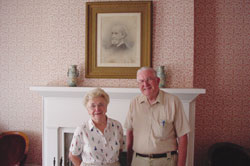 |
|
Photo by Helen McKinney Rob
Morris home trustees Marjorie |
A reformer in the early days of the American lodges, he
was never satisfied that the good deeds of Masonry should be confined
to men. Morris firmly believed that Masonry was an organization for
the entire family.
And each year his life is celebrated in August at the Rob Morris Shrine,
which was his former home at 110 E. Washington St. in La Grange, Ky.
Every year on the third Sunday in August a pilgrimage is held at the
home. Scheduled for Aug. 17 this year, this event includes a program
at the home and a graveside memorial service at the Valley of Rest Cemetery,
where Morris is buried. More than 500 people are expected to attend,
with many traveling from other states.
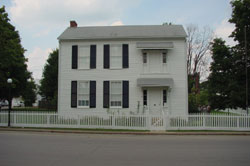 |
|
Photo by Helen McKinney Rob Morris home in La Grange, Ky. |
Morris was born on Aug. 31, 1818, near Boston, Mass.,
and spent his childhood in New York City. His parents were teachers,
and he attained a liberal education, receiving degrees in both law and
philosophy.
He had a keen interest in theology and devoted much time to Bible study.
He became an educator, author, poet and song lyricist. Morris dedicated
most of his life to writing and lecturing about Masons.
Morris moved south and married Germantown, Tenn., native Charlotte Mendenall
on Aug. 26, 1841. To this union were born nine children, seven of whom
lived to adulthood.
Four years after his marriage, Morris relocated to Oxford, Miss., to
become president of Mt. Sylvan Academy. At 27, Morris was brought to
Masonic light at Gathright Lodge No. 33 on Mar. 5, 1846. When his tenure
at Mt. Sylvan was finished, Morris traveled extensively in Mississippi
and Tennessee, lecturing on Masonic history.
In his book, “Pioneering in Masonry,” Lucian Rule chronicled
Morris’ life. Rule wrote that Morris firmly believed that a man
must be “prepared in his heart to become a Mason.”
It was during his early travels that Morris became consumed with the
idea of establishing an organization geared toward the female relatives
of Master Masons. Morris founded the Order of the Eastern Star (OES)
and based its principles upon Biblical examples of heroic conduct and
moral values. These noble principles, in turn, adorn the personal lives
of each OES member.
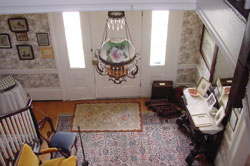 |
|
Photo by Helen E. McKinney Front foyer of Rob Morris home. |
Maurice E. Meador is one of two trustees of the Rob Morris
Shrine in La Grange and has been a member of the Masonic fraternity
for nearly 45 years and a member of the OES for 43 years. Meador said,
“I had heard so many good things about the Masonic Order and the
Shrine that I just knew I wanted to be a part of a fraternity that would
make me a better person.”
Since its conception, the purposes of the OES have remained the same:
charitable, educational, fraternal and scientific. Rule wrote in his
book that Freemasons do not court publicity. This is a Masonic principle
by which Morris lived.
“Both organizations do many, many charitable things, both physically
and financially; however, we do not boast about how much we do to make
the world a better place,” Meador said.
Morris had long wanted to develop a concrete plan for the OES. He was
able to construct the Eastern Star Degrees in 1850 while confined to
his home after an accident. Morris said of the degrees, “If the
Order is worth anything, it will live.”
Marjorie Morgan, second trustee, has belonged to the OES for almost
49 years. During this time, the organization has been a silent annual
contributor to charities aiding cancer patients, H.E.A.R.T., and this
year’s choice, the Special Olympics in western Kentucky.
Morgan said that what she loves best about her involvement with the
OES is that she has “never met a stranger.” Germany and Aruba
are just a few of the faraway places she has traveled to for chapter
meetings. From the moment she stepped into a chapter room, she felt
as if she had always known the occupants as friends, she said.
“If it hadn’t been for Morris, I wouldn’t have had this
opportunity.”
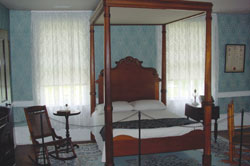 |
|
Photo by Helen E. McKinney Rob Morris’ bedroom. |
Morris had migrated to Kentucky in 1852. He settled in
Lodgetown, in Fulton County, Ky., with his family in a hewn-log house
built by his brother-in-law, Francis Mendenall. It was while returning
from the nearby town of Hickman, Ky., that he sat down on a fallen tree
and wrote his most famous Masonic poem on the back of an envelope, “The
Level and the Square.” A large copy of this work hangs in the Rob
Morris home in La Grange.
Morris came to Louisville in 1860 as a journalist for a Masonic paper,
said Morgan. Morris contributed extensively to Masonic papers throughout
the country, composing many of his Masonic writings while riding horseback.
He was soon thereafter appointed professor of Ancient and Modern History
at the Masonic College (later known as the Masonic University) in La
Grange. Originally founded as the Funk Seminary, Morris became the university’s
president in 1862.
He rented the house on Washington Street for two years before purchasing
it for his family on Sept. 30, 1864, for $1,400. The home is believed
to date to the late 1840s, said Morgan.
Dr. Robert Fitch, great-grandson of Morris, paints a very down-to-earth,
family oriented picture of Morris. It was at the present home in La
Grange, where Morris and his wife raised seven children in a three-bedroom
home, said Fitch. To escape the hustle and bustle and the cramped conditions,
Morris was forced to seek a more peaceful office space in a small cabin
on the west side of the home, said Fitch. Numerous sacks of mail were
often delivered to its doorstep.
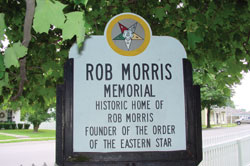 |
|
Photo by Helen E. McKinney Historic marker in the front yard. |
All who came in contact with him generally adored Morris.
But in conjunction with the brewing tensions in the United States that
would soon split the nation apart, there were a few individuals who
opposed him.
In September 1861, Morris occupied a commission as a Masonic lecturer
under the Grand Master of Indiana. While he was on a tour at Crown Point,
Ind., on Nov. 7, his home in La Grange was “burned by the midnight
torch and my family turned out to the night air homeless,” he wrote.
Guerrillas may have been responsible for destroying the home.
“He had friends on both sides,” said Fitch. Whatever the reason,
a lot of memorabilia was lost, said Fitch. Morris rebuilt his home,
and it was the resulting Civil War that eventually closed the doors
of the Masonic University in La Grange.
Morris traveled extensively thereafter, pursuing his interest in organizing
Masonic lodges, not just the OES, said Fitch.
Religion and fraternity went hand-in-hand for Morris. He made two trips
to the Holy Land in his lifetime, visiting Syria, Damascus, Joppa and
Jerusalem. It was his great desire to visit the land where Christ had
lived, and as a result, he was inspired to create many lyrics and poems.
“He had a talent for music,” said Fitch. Morris composed many
hymns for the OES and the Masons.
While resting on the banks of the Sea of Galilee in February 1868, he
penned the words to his most famous hymnal, “Memories of Galilee”
(or “Each Cooing Dove”). He returned to the Holy Land in 1878.
To finance these trips, Morris sold stock certificates, said Morgan.
He also brought back mementos, such as seashells from the Sea of Galilee
and water from the Dead Sea. For $10, Morris would assemble a curio-type
cabinet to hold these mementos in small bottles.
The pinnacle of his career was on Dec. 17, 1884, when more than 500,000
Master Masons chose to bestow upon him title of Poet Laureate of Masonry
at the Masonic Temple in New York. Morris was the first to hold the
title since it had been conferred on the first Poet Laureate of Masons,
English poet Robert Burns.
Morris wrote more than 300 poems, many devoted to the Masons, their
rituals, practices and beliefs. The OES has grown into an organization
with more than 20,000 members in Kentucky alone and many more members
worldwide.
Morris died on July 31, 1888, and was mourned by the entire Masonic
world. His wife lived in their home in La Grange until her death in
1893. The home passed through several different hands until the Grand
Chapter of Kentucky purchased it in 1918 and began renovating it in
1970. The home is now open to the public as a museum.
Meador said Morris “worked diligently to organize the OES. Without
Rob Morris there would be no OES. Therefore the Masonic Fraternity and
the OES members owe him a debt of gratitude.”
Rule stated in his book an opinion that many have shared of Morris.
“What Washington was to Liberty in his time, what Lincoln was to
Equality in his age, Rob Morris was to fraternity in his generation
and all succeeding years.”
An exhibit centering on Morris and the Masonic organization, “Freemasonry
in Oldham County History,” is currently on exhibit at the Oldham
County History Center through Dec. 31. There is also a PBS special program
available about Morris’ life. To obtain this program, visit www.pbs.org.
There are also many Internet websites devoted to Morris.
• For more information on the upcoming event, contact the OES
Grand Chapter of Kentucky at (502) 222-0248.